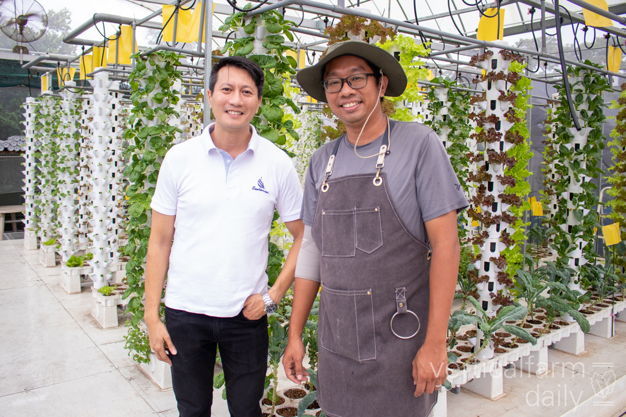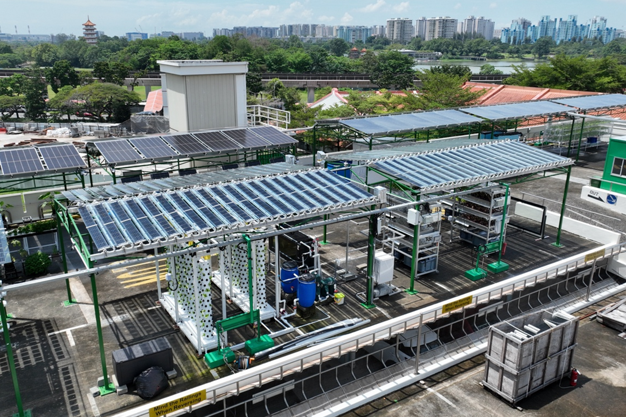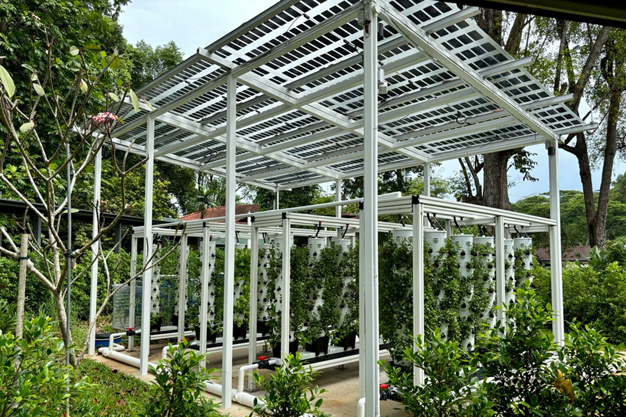"We've been working on creating a more commercially resilient and sustainable urban farming system that benefits farmers, our environment and our health," says James Yin, CEO of V+ Agritech, a Singapore-based startup combining agrivoltaics and aquaponic systems.
Since 2023, the company has partnered with the National University of Singapore Solar Energy Research Institute of Singapore (NUS-SERIS) in agrivoltaic research. They have a joint research testbed combining agrivoltaics and aquaponics on a rooftop multi-story car park.
"Since August last year, we have been testing different vegetables and collecting data on solar radiation to understand how it affects plant growth and biomass. It's incredibly critical to ensure the crops can thrive under the shading of solar panels while still receiving enough light and nutrients to grow." The combination of crop shading and the generation of renewable energy received a growing amount of interest from clients and investors.

James Yin and Nelson Tan
Farm upgrades
In parallel with their research, V+ Agritech upgraded its farm at Neo Tiew, supported by the Singapore Food Agency, between December and April this year by redesigning the fish tanks and grow towers. Moving the fish from the platform to the side, and placing them in conventional tanks, the team hopes for easier management. "This adjustment will make the system more commercial and scalable but also allow it to be a decoupled system. Meaning that if there's an issue with the fish, the plants won't be affected, allowing for better business continuity," he adds.
With the farm upgrades, the R&D team has noticed better nutrient management as iron e.g., is now added directly to the plants. On top of that, the fish's diet can be adjusted for better growth, something previously impossible without affecting plant health. "Now we can fatten the fish without compromising plant growth, optimizing both for commercial purposes," James notes.
Microbial research
Driving the sustainability aspect throughout the entire supply chain, V+ Agritech has been tapping into microbial systems to replace the use of chemical fertilizers eventually. In collaboration with the National University of Singapore Environmental Research Institute (NERI), the company has been studying the impact of microbes on plant growth for two years. "We're at TRL 6 now, having tested the technology on a single grow tower. The next step is to scale up to 160 towers to see if we can achieve consistent benefits at a mass level," James explains.
Ultimately, the goal is to demonstrate that microbial systems can deliver better plant growth, higher yields, and improved crop quality, all while substantially reducing the need for chemical fertilizers.

A rooftop project in Singapore
International expansion
"Despite facing a slight setback in April when we weren't awarded land for a 2-hectare farm site in Singapore, we gained international traction," James says. V+ Agritech was shortlisted by Bedayat, a business incubator in the UAE, to participate in a bootcamp where the company won the Best Startup award out of some 400 companies from 60 countries who participated.
This victory led to an opportunity to work with SEE Holdings, a property developer focused on building sustainable townships across the UAE and other regions. "Our role is to help design farming systems within these cities, providing fresh food in a fully integrated and self-sustaining environment. With this collaboration, we aim to impact the Middle East by integrating urban farming systems into residential developments," James explains.
Realizing that it's not all sunshine and roses, James is realistic about the challenges of implementing such systems. "Not every project will feature agrivoltaics, it's costly, and not all clients are ready for it. But for those who are, we're ready to implement for them," he added. The company recently completed such a project in July 2024: a fully circular urban farm for a pre-school featuring agrivoltaic panels, aquaponics, vertical grow towers and a landscaped aquaculture pond.

Another agrivoltaic project
Targeting Social Impact
Beyond farming, V-Plus Agritech is making progress in social responsibility. "We're working on integrating our farming systems into spaces like hotels, hospitals, and logistics centers, while also exploring ways to incorporate educational and rehabilitative elements into our projects."
The company is bidding for projects where individuals with disabilities or rehabilitated in prisons. Dipping into this new area of expertise, the goal is to provide them with agricultural skills that can help them reintegrate into society. The company has recently won a tender to build a vocational training farm to train special needs individuals to equip them for future employment."There are so many sectors we can reach, and a lot of potential for us to create meaningful impact through our systems." James concludes.

For more information:
V-Plus Agritech Pte Ltd
James Yin, CEO
[email protected]
https://vplusagritech.com
